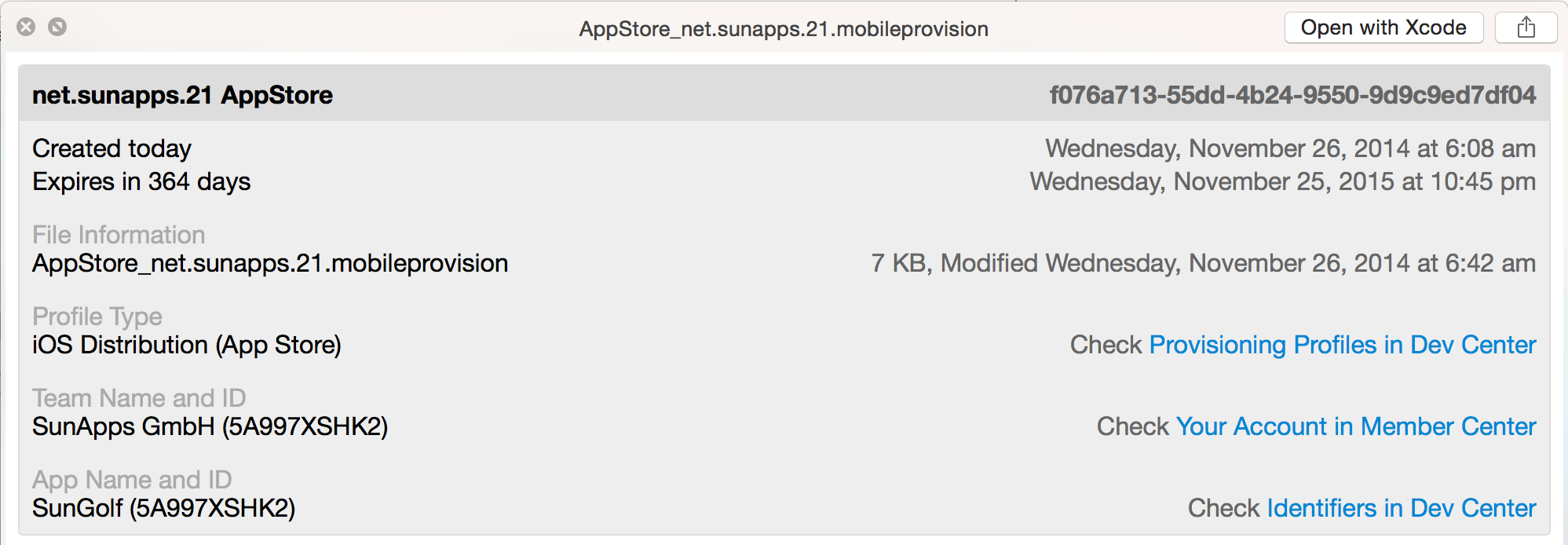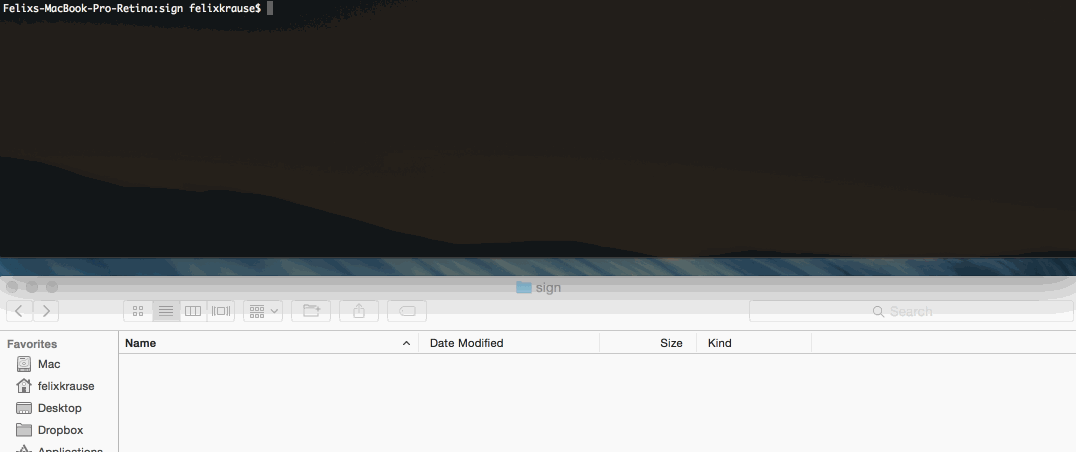deliver • snapshot • frameit • PEM • sigh • produce • cert • spaceship • pilot • boarding • gym • scan
-------sigh can create, renew, download and repair provisioning profiles (with one command). It supports App Store, Ad Hoc, Development and Enterprise profiles and supports nice features, like auto-adding all test devices.
Get in contact with the developer on Twitter: @KrauseFx
Features • Installation • Usage • Resign • How does it work? • Tips • Need help?
sigh is part of fastlane: connect all deployment tools into one streamlined workflow.
- Download the latest provisioning profile for your app
- Renew a provisioning profile, when it has expired
- Repair a provisioning profile, when it is broken
- Create a new provisioning profile, if it doesn't exist already
- Supports App Store, Ad Hoc and Development profiles
- Support for multiple Apple accounts, storing your credentials securely in the Keychain
- Support for multiple Teams
- Support for Enterprise Profiles
To automate iOS Push profiles you can use PEM.
sighcan easily be integrated into your CI-server (e.g. Jenkins)- Xcode sometimes invalidates all existing profiles
- You have control over what happens
- You still get to have the signing files, which you can then use for your build scripts or store in git
See sigh in action:
sudo gem install sigh
Make sure, you have the latest version of the Xcode command line tools installed:
xcode-select --install
sigh
Yes, that's the whole command!
sigh will create, repair and download profiles for the App Store by default.
You can pass your bundle identifier and username like this:
sigh -a com.krausefx.app -u username
If you want to generate an Ad Hoc profile instead of an App Store profile:
sigh --adhoc
If you want to generate a Development profile:
sigh --development
To generate the profile in a specific directory:
sigh -o "~/Certificates/"
To download all your provisioning profiles use
sigh download_all
For a list of available parameters and commands run
sigh --help
By default, sigh will install the downloaded profile on your machine. If you just want to generate the profile and skip the installation, use the following flag:
sigh --skip_install
To save the provisioning profile under a specific name, use the -q option:
sigh -a com.krausefx.app -u username -q "myProfile.mobileprovision"
If for some reason you don't want sigh to verify that the code signing identity is installed on your local machine:
sigh --skip_certificate_verification
If you need the provisioning profile to be renewed regardless of its state use the --force option. This gives you a profile with the maximum lifetime. --force will also add all available devices to this profile.
sigh --force
By default, sigh will include all certificates on development profiles, and first certificate on other types. If you need to specify which certificate to use you can either use the environment variable SIGH_CERTIFICATE, or pass the name or expiry date of the certificate as argument:
sigh -c "SunApps GmbH"
For a list of available parameters and commands run
sigh --help
sigh can automatically repair all your existing provisioning profiles which are expired or just invalid.
sigh repair
If you generated your ipa file but want to apply a different code signing onto the ipa file, you can use sigh resign:
sigh resign
sigh will find the ipa file and the provisioning profile for you if they are located in the current folder.
You can pass more information using the command line:
sigh resign ./path/app.ipa -i "iPhone Distribution: Felix Krause" -p "my.mobileprovision"
With sigh manage you can list all provisioning profiles installed locally.
sigh manage
Delete all expired provisioning profiles
sigh manage -e
Or delete all iOS Team Provisioning Profile by using a regular expression
sigh manage -p "iOS\ ?Team Provisioning Profile:"
Run sigh --help to get a list of all available environment variables.
If you're using cert in combination with fastlane the signing certificate will automatically be selected for you. (make sure to run cert before sigh)
sigh will access the iOS Dev Center to download, renew or generate the .mobileprovision file. It uses spaceship to communicate with Apple's web services.
sigh uses the CredentialsManager from fastlane.
fastlane Toolchain
fastlane: Connect all deployment tools into one streamlined workflowdeliver: Upload screenshots, metadata and your app to the App Storesnapshot: Automate taking localized screenshots of your iOS app on every deviceframeit: Quickly put your screenshots into the right device framesPEM: Automatically generate and renew your push notification profilesproduce: Create new iOS apps on iTunes Connect and Dev Portal using the command linecert: Automatically create and maintain iOS code signing certificatesspaceship: Ruby library to access the Apple Dev Center and iTunes Connectpilot: The best way to manage your TestFlight testers and builds from your terminalboarding: The easiest way to invite your TestFlight beta testersgym: Building your iOS apps has never been easierscan: The easiest way to run tests of your iOS and Mac app
Download and install the Provisioning Plugin.
It will show you the mobileprovision files like this:

If you also want to create a new App Identifier on the Apple Developer Portal, check out produce, which does exactly that.
sigh will never touch or use the profiles which are created and managed by Xcode. Instead sigh will manage its own set of provisioning profiles.
Please submit an issue on GitHub and provide information about your setup
This project is licensed under the terms of the MIT license. See the LICENSE file.
This project and all fastlane tools are in no way affiliated with Apple Inc. This project is open source under the MIT license, which means you have full access to the source code and can modify it to fit your own needs. All fastlane tools run on your own computer or server, so your credentials or other sensitive information will never leave your own computer. You are responsible for how you use fastlane tools.





